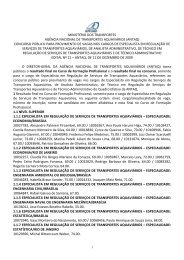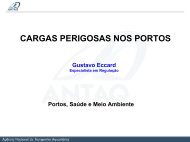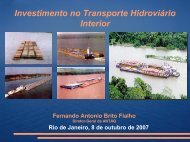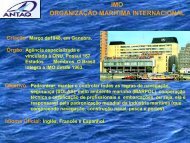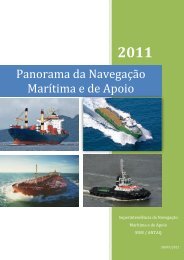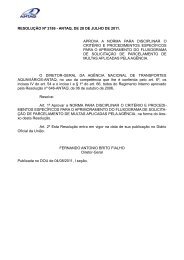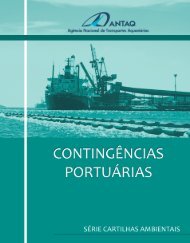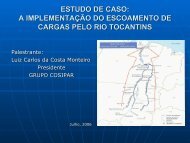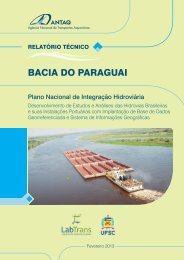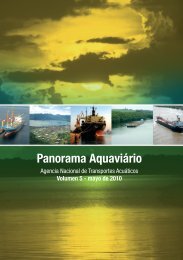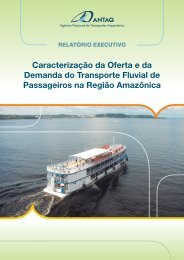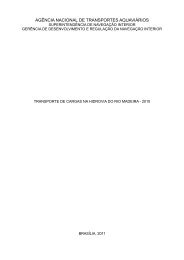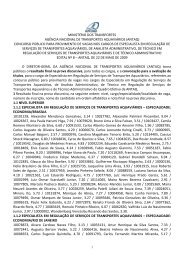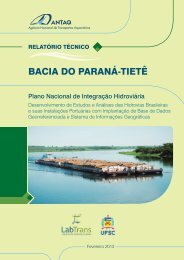Waterway Panorama - Antaq
Waterway Panorama - Antaq
Waterway Panorama - Antaq
Create successful ePaper yourself
Turn your PDF publications into a flip-book with our unique Google optimized e-Paper software.
Revision of CONAMA Resolution 344/04<br />
The first licensing rules that enable or guarantee<br />
the quality of production environments<br />
are under review. Of these, the best<br />
known regulation is CONAMA Resolution<br />
344/04. The Brazilian environmental clearance<br />
progress lacks environmental management regulations,<br />
unlike licensing rules, which could be<br />
simplified, without losing their potential to ensure<br />
environmental quality.<br />
As for environmental management, there are<br />
not many rules. The regulatory process of environmental<br />
management, necessarily beginning<br />
with licensing to establish the focus of management,<br />
needs to be expanded. It may comprise<br />
compulsory rules, which mostly follow the<br />
line of manuals or similar procedures. We have<br />
this culture and, unfortunately, do not follow<br />
other countries.<br />
The CONAMA Resolution 344, in turn, has<br />
that opportunity. It could constitute a new model<br />
of environmental regulation, in a comprehensive<br />
document, with a good mastery of the principles<br />
that govern environmental laws, good<br />
range of content, aggregation of state-of-the-art<br />
technology in dealing with environmental protection,<br />
and proper understanding. These are<br />
the attributes of environmental management<br />
instruments.<br />
In the revision of environmental regulations,<br />
this has been the proposal of ANTAQ and other<br />
stakeholders of port activities. This means moving<br />
forward on environmental regulation, so<br />
that we may implement management tools that<br />
environmental agencies and production agents<br />
need. In the current design of our system of environmental<br />
qualification, this task would be attributed<br />
to CONAMA, which, however, has been<br />
shy in promoting the advancement of environmental<br />
technology.<br />
To remedy this lack of environmental governance,<br />
ANTAQ, alongside the Ministry of Environment<br />
(MMA), is developing instructions in the<br />
form of manuals or handbooks that make it<br />
easier for port agents to protect the environment.<br />
This work is in the context of the Port Environmental<br />
Agenda, nationally. The Local Environmental<br />
Agenda differs by the presence of environmental<br />
regulation locations and (public<br />
and private) regulated agents.<br />
In this case, it is important that the manuals<br />
are sufficiently indicative regarding the stakeholders’<br />
action to achieve the desired end result;<br />
a healthy environment in terms of occupational<br />
safety and health; and valuation of natural resources<br />
existing in this environment.<br />
The elaboration of the new document, replacing<br />
CONAMA Resolution 344, will induce<br />
the formation of an environmental database.<br />
This database should already be available to<br />
private agents, but it is not due to the lack of focus<br />
on the environmental issue of licensing<br />
agencies. This database, addressed by Law<br />
10,650/03, would be developed by federal and<br />
local environmental agencies as a result of the<br />
licensing, as they excel in this area and have a<br />
responsibility within the system of environmental<br />
regulation created by Law 6,938/81.<br />
This type of information among the most important<br />
environmental principles, as it requires<br />
us to perform the scientific and technical development,<br />
present in nearly all the environmental<br />
regulation, particularly in CONAMA 344, i.e.,<br />
the relationship between agents and impact<br />
produced by them.<br />
In the original version of CONAMA 344, due<br />
to the lack of these environmental data, the<br />
resolution had to be restricted to assessing the<br />
quality of sediments. Today, it has no support, as<br />
it is possible to have a resolution of the environmental<br />
management of these services in the<br />
ports, adding the knowledge acquired on environmental<br />
dredging. This is a limitation of the<br />
current Resolution that needs to be corrected.<br />
59



